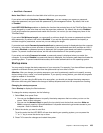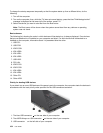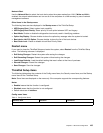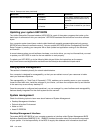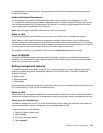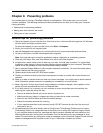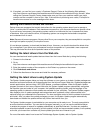
Table 5. Security menu items (continued)
Submenu item Selection Comments
Security Chip
• Active
• Inactive
• Disabled
If you select “Active,” Security Chip
is functional. If you select “Inactive,”
Security Chip is visible, but is not
functional. If you select “Disabled,”
Security Chip is hidden and is not
functional.
Security Reporting Options
Enable or disable the following
Security Reporting Options.
• BIOS ROM String Reporting: BIOS
text string
• ESCD Reporting: Extended
system conguration data
• CMOS Reporting: CMOS data
• NVRAM Reporting: Security data
stored in the Asset ID
• SMBIOS Reporting: SMBIOS data
Clear Security Chip
• Enter
Clear the encryption key.
Note: Only if you select “Active” for
Security Chip, this item appears.
Intel
®
TXT Feature • Disabled
• Enabled
Enable or disable Intel Trusted
Execution Technology.
UEFI BIOS Update Option
Flash BIOS Updating by End-Users
• Disabled
• Enabled
If you select “Enabled,” all users
can update the UEFI BIOS. If you
select “Disabled,” only the person
who knows supervisor password can
update the UEFI BIOS.
Flash Over LAN
• Disabled
• Enabled
Enable your computer's UEFI BIOS to
be updated (ashed) over an active
network connection.
Memory Protection
Execution Prevention • Disabled
• Enabled
Some computer viruses and worms
cause memory buffers to overow
by running code where only data
is allowed. If the Data Execution
Prevention feature can be used
with your operating system, then by
selecting “Enabled” you can protect
your computer against attacks by
such viruses and worms. If after
choosing “Enabled” you nd that an
application program does not run
correctly, select “Disabled” and reset
the setting.
Virtualization
Chapter 8. Advanced conguration 111



